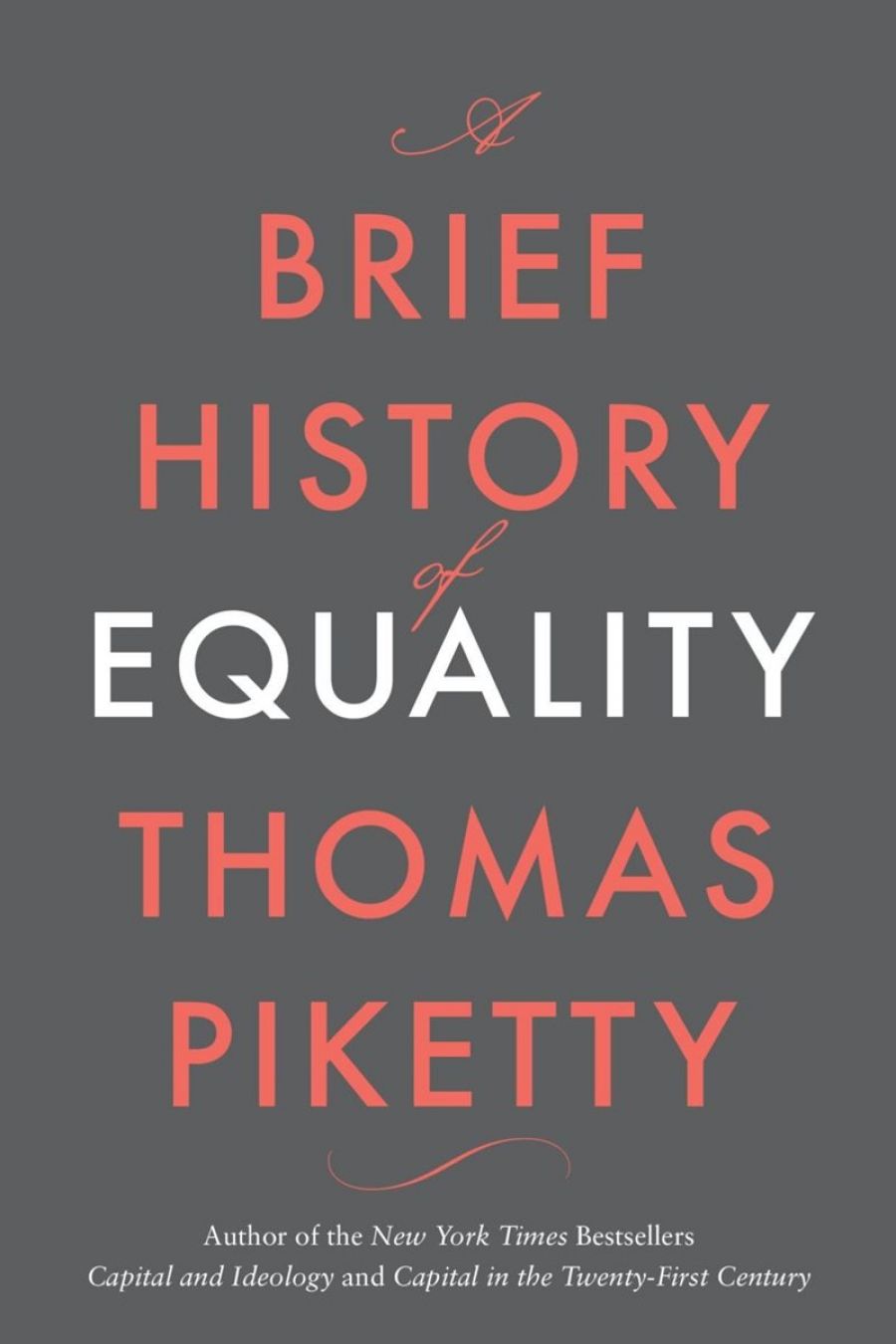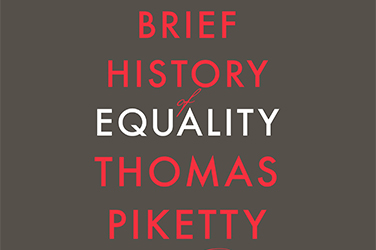
- Free Article: No
- Contents Category: History
- Review Article: Yes
- Article Title: A battle of ideas
- Article Subtitle: Thomas Piketty’s new book
- Online Only: No
- Custom Highlight Text:
Capital in the Twenty-First Century (2013), by French economist Thomas Piketty, is wholly unlike Sally Rooney’s Normal People (2018) bar one telling, if esoteric, similarity. For a period of time during the 2010s, being seen with the book mattered more than having read it. Ed Miliband, former leader of the British Labour Party, boasted that he had not progressed beyond the first chapter. WIRED reported that the five most highlighted passages on Kindle were in the book’s first twenty-six pages.
- Featured Image (400px * 250px):

- Alt Tag (Featured Image): Yassmin Abdel-Magied reviews 'A Brief History of Equality' by Thomas Piketty, translated by Steven Rendall
- Book 1 Title: A Brief History of Equality
- Book 1 Biblio: Harvard University Press $47.95 hb, 282 pp
- Book 1 Readings Link: booktopia.kh4ffx.net/qnqYJL
 Thomas Piketty (photograph via Brittanica/Charles Platiau/Reuters/Landov)
Thomas Piketty (photograph via Brittanica/Charles Platiau/Reuters/Landov)
Despite The Economist’s labelling him ‘the modern Marx’, Piketty is far from communist. Travels through Eastern Europe in the aftermath of the Soviet collapse convinced the young Frenchman of capitalism’s superiority and of the need to ‘get away from these crazy ideas, and trust much more market forces and competition’, as he told journalist Simon Kuper after the publication of the bestseller’s successor, Capital and Ideology (2019). In that doorstopper, Piketty posited that inequality was a political choice. Societies create ideologies to justify inequality, and thus equality is a battle of ideas.
It is this contest of concepts and (re)interpretation of history that Piketty addresses in his latest and mercifully slimmer offering, A Brief History of Equality. A summary of and expansion on his previous work, Piketty uses ten dense chapters to furnish a ‘comparative history of inequalities among social classes in human societies’, to learn how equality has been produced, and how to make it a ‘lasting reality’. While ‘revolts, revolution and political movements of great scope’ set the scene for economic, political, and social transformation, Piketty cautions that there is no guarantee egalitarian and emancipatory regimes will replace them.
A Brief History’s tone is optimistic. ‘Human progress exists,’ he glibly reminds us, laying out the advances in education and healthcare ‘for all’, increases in average incomes and life expectancies, transformations in property law, the emergence of the ‘patrimonial middle class’. Two chapters are appropriately dedicated to the heritage of slavery and colonialism, drawing heavily on Ken Pomeranz’s The Great Divergence (2000) and emphasising the central role ‘transnational militarised robbery’ played in the Western world’s acquisition of wealth. We organised the world economy to our benefit, Piketty notes, so should pay reparations, ‘unless we want deep and lasting injustice to continue’. Pragmatism, not guilt, operates as the primary driver of these policy proposals, despite the passing admission that pure economic compensation falls short of the ‘systemic’ change required.
After exploring the ‘Great Redistribution’ between 1914 and 1980, the last four chapters cast their eyes ambitiously to the future. Here, Piketty reiterates the case for his favoured strategies: the bolstered welfare state and progressive (effectively confiscatory) taxation. Whether it be a basic income scheme, a system of guaranteed employment, or distributed inheritance, Piketty mounts an impassioned call for a new form of participatory, democratic socialism, self-managing and ecological, multicultural and decentralised.
‘We’ve done it before, and we can do it again’, is the message. After all, ‘at least since the eighteenth century, there has been a historical movement towards equality’.
Equality where, and for whom? What, in Piketty’s reading, does equality even mean? The word ‘justice’ is sprinkled liberally throughout the work, but little time is taken to adjudicate implications beyond a reduction in economic inequality, largely within Western nations. Any activist worth their placard could tell that ‘equality’ and ‘justice’ are pas la même chose. Piketty shares with American political scientist Francis Fukayama an assumed position of universality, betraying an inability to decentre the West (itself an ill-fitting synecdoche) from the concept of capital H ‘History’. For a start: why begin investigating from 1780? Sans context, we are left with the impression that the ‘history of equality’ begins with the French Revolution (so ‘post-colonial’). The long nineteenth century, besides being a period in which French wealth inequalities grew, was also an era of global imperial subjugation. The wholesale destruction of cultures, communities, and ways of life doth not ‘a historical movement toward equality’ make. Further, framing slavery and colonialism solely through economic value purloined by the metropole runs the risk of diminishing the monumental loss borne by enslaved and colonised people. Colonialism ‘introduced money relations at the expense of kinship ties’, wrote activist and historian Walter Rodney in How Europe Underdeveloped Africa (1972), plunging societies into a ‘cultural and psychological crisis’. Despite attempts to be responsive to critiques of Eurocentrism, his efforts are deficient, inadequate. His narrative is conditional at best, deceptive at worst.
There is no better illustration of this than his attitude to the globe’s youngest, and Blackest continent. Africa remains, in Piketty’s imagination, a site of repair rather than one rich with innovation, progress, wisdom. By asserting that globally ‘no present regime’ can teach anything about ecology or patriarchy, he erases the achievements of Rwanda, an East African nation with more than sixty per cent of representatives in its national parliament being women, and the sustainable and ecological systems of practice developed by indigenous people the world over. He references the post-colonial, but takes a painfully French (‘I don’t see race’) approach to racial and religious injustice, spuriously implyingthat opposition to racial quotas is ‘not entirely without foundation’, warning against the ‘rigidification of ethno-racial identities’ – as if French identity sits outside any conception of race, not to mention the role of colonisers in rigidifying identities to begin with. My second-hand embarrassment was overwhelming.
‘The advance towards equality is a battle that began long ago and needs only to be continued,’ Piketty asserts. He is right. But neither the revolution nor subsequent nation building was led by economists. Expertise on economic inequality is a diagnostic tool, poor preparation for insight into building a more just world.


Comments powered by CComment